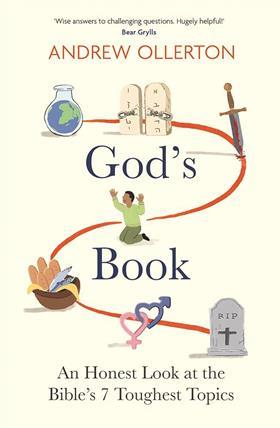When we come across difficult passages in the Old Testament, we needn’t turn away says Dr Andrew Ollerton. Here’s how we can better understand them
One day, our eldest son ran into the house, full of excitement. “I just saved Toby’s life!” he exclaimed. My wife and I were momentarily impressed. But then his younger brother came in, soaked to the skin and furious: “Joel just pushed me in the pond!”
We stared at our boys, bewildered. Then it clicked. Joel had become fixated on collecting Blue Peter badges, especially the prestigious gold badge awarded to young people for outstanding achievements such as saving someone’s life. Desperate to earn one, Joel had shoved Toby in the pond, half dragged him out and then ran indoors to claim his prize.
This amusing incident offers a serious lesson: when we isolate a text from its context, it’s easy to misconstrue motive and intention. In Joel’s case, understanding the backstory proved rather incriminating. With the Bible, it’s often the other way round. This is especially true for passages containing violence, whether it’s the military conquest of Canaan, the brutal tales contained in the book of Judges or the psalmist’s angry cries for revenge. It’s easy to misunderstand God’s instructions – or even to weaponise them to justify modern day conflicts. That said, the claim that “religion causes wars” has been exaggerated. According to the Encyclopaedia of Wars, only 121 of 1,763 recorded conflicts – or 6.87 per cent – had religion as their primary cause.
Nevertheless, brutal stories in the Old Testament raise difficult questions, such as: “Why would God instruct his people to fight and kill in his name?” My encouragement is not to slam the Bible shut whenever we read something unpleasant, but to hold our nerve and instead reflect on why we find violence in the Bible so offensive. We also need to ask: What was going on in the original context and setting? As with our family’s pond drama, there’s often a different perspective.
The bigger picture
The first thing to remember is that the Bible tells a unified story that centres on Jesus. It begins in peace – in a garden where humanity dwells in harmony with God. And it ends in peace – in a new creation where tears are wiped away and violence is no more. What happens in the messy middle, including the violence, is not the goal of the story but the problem the story is addressing.
The cross of Christ, planted within the messy middle, is God’s way of subverting violence with love and redeeming this world by his own blood. Martin Luther once described Christ as the “central point of the circle”. We mustn’t read the Bible in a strictly linear fashion, as though Jesus only becomes relevant when he makes an appearance two-thirds of the way through. We must work it out from the centre, shuttling backwards and forwards to Christ. He is the ultimate revelation of God’s character and the lens through which we interpret everything else, including violent passages.
Far from delighting in violence, God’s Son took it upon himself
As with any ‘problem’ in the Bible, it’s also worth reflecting on why we especially consider it a problem. While researching for my latest book, I asked people to vote on which issue in the Bible they found most disturbing. Top of the list every time for the Old Testament is warfare and violence. Why might this be? Other civilisations, past and present, are not offended by the strong conquering the weak. It’s considered a badge of honour and success.
But in the West, the teaching of Jesus has conditioned our moral sensitivities more than we realise. We instinctively applaud those who sacrifice themselves for others and condemn individuals or nation states who use force to coerce and dominate. Ironically, teachings such as “turn…the other cheek” (Matthew 5:39) or “love your enemies” (Matthew 5:44) would have been the stumbling blocks in the ancient world, not the warfare passages. The reason we have a lump in our throats when we read about Joshua attacking Jericho is because we’ve been shaped by Jesus, who raised the moral bar to new heights. This doesn’t solve the problem, but it at least points to the one uniquely qualified to do so.
Three types of violence
We need to appreciate that the Bible contains different kinds of violence that should be interpreted differently:
1. Gratuitous violence
Not everything is what-the-Bible-teaches
Much of the Bible’s violence is descriptive, not prescriptive. Just because something happened doesn’t mean God desired it or approved it. Take the book of Judges, which is intentionally graphic. It reads more like an ancient dystopia than a moral guidebook. From brutal assassinations to gang rape and mutilation, the message is clear: “In those days there was no king…Everyone did what was right in his own eyes” (Judges 21:25, ESV). Characters such as Samson or Jephthah are not role models, they’re cautionary tales exposing the tragic consequences of sin.
2. Emotional violence
Unresolved anger can become toxic
Some nights before bed, we have a ‘Psalm-of-the-day’ moment with our kids. Occasionally, we stumble across uncomfortable verses such as: “Daughter Babylon…Happy is the one who seizes your infants and dashes them against the rocks” (Psalm 137:8-9).
Written when God’s people were in exile, it gives voice to deep anger and a longing for justice. In that context, the intention of the psalm was not to promote violence – quite the opposite. By providing a space for honest lament, these kinds of psalms channel unfiltered outrage to God.
We’re all capable of angry or violent responses towards even relatively trivial things. A kids’ football match, computer game or a driver who cuts you up, can trigger a darker side – let alone serious forms of injustice, oppression and abuse. Instead of letting toxic emotions spill over, taking revenge or sulking behind passive-aggressive behaviours, the Bible instructs us to redirect our honest feelings to the only one who can heal and purify them.
3. Holy war
God authorised warfare in a unique context
By far the most challenging category of violence in the Bible is warfare that God himself commands, especially during the conquest of Canaan. For example, under the leadership of Joshua, the Israelites were told to march round the city of Jericho seven times. When the wall collapsed, they “destroyed with the sword every living thing in it – men and women, young and old, cattle, sheep and donkeys” (Joshua 6:20-21).
These brutal stories are often omitted from children’s Bibles or Sunday school lessons, but we can’t avoid them forever. Jericho is only the first of 31 cities which Israel conquered when they invaded the Promised Land. To many, it is tantamount to genocide.
However, as with the pond incident, understanding the backstory can significantly affect the way we interpret these difficult stories. For example, when we hear the word ‘city’ we assume a large civilian population. However, they were more like castles or fortified garrisons, with most people living outside of them. Some scholars estimate that Jericho was home to around 150 soldiers, along with a few civilians who served them. If Jericho was less like London and more like the Tower of London, it explains why the Israelites were able to march round it seven times in a day, and it reframes the scale of the slaughter. As these fortified ‘cities’ fell, civilians living in the surrounding area would have had the chance to flee. This explains why many passages emphasise the Canaanites being driven out rather than wiped out; expelled rather than killed (see Exodus 23:30; Deuteronomy 11:23).
When Christians weaponise the Bible, they misunderstand the heart of the gospel
Moreover, the book of Joshua was written in an ancient culture where hyperbole and exaggeration were commonly used to describe military victories. Imagine it like football fans saying our team ‘destroyed’ or ‘annihilated’ the opposition. The clues are in the text: “Joshua subdued…the whole region’ (Joshua 10:41)…‘they left no survivors” (Joshua 10:39). And yet a couple of chapters later, Joshua warns his fellow Israelites not to compromise with the Canaanites who still lived among them (Joshua 23:7). The next book of the Bible opens with a revealing question: “Who of us is to go up first to fight against the Canaanites?”’ (Judges 1:1). In short, Joshua’s heavily stylised account should not be interpreted in an overly literal manner.
While these qualifiers may revise the scale and severity of the slaughter, reading the actual stories still leaves a lump in our throats. So, how should we understand God’s purpose in these violent passages?
A unique moment
We must remember the backstory. As God’s chosen people, the Israelites were asylum seekers who had escaped the oppression of Pharaoh, wandered for decades in the wilderness, and were now in desperate need of a place to call home. This was not a barefaced land grab by a strong military power. The Israelites were former slaves, weak and vulnerable. Their military tactics included blowing trumpets. It’s a big mistake to read these stories as Israel punching down.
Instead, this was a unique, one-off moment when God authorised the use of force to secure a homeland for his chosen people. But why the need for violence? Couldn’t God have clicked his fingers like Mary Poppins instead? This is the Bible, not a Disney movie. Whether we like it or not, God has chosen to accommodate fallen cultures and partner with real people to achieve his purpose. He works through gritty realities like geography, tribal warfare and free will; he doesn’t bypass them.
Moreover, under the Old Covenant, the Israelites were a theocracy, or nation-under-God. He dictated their laws and assisted their armies. Under the New Covenant, this is no longer the case. God’s people are now an international family, and “our struggle is not against flesh and blood” (Ephesians 6:12). So, when Christians weaponise passages in the Bible – whether during the Crusades or in modern conflicts – they misuse scripture and misunderstand the heart of the gospel.
A universal warning
As God’s covenant nation, the Israelites were also a blunt instrument through which evil practices were judged. On several occasions, Moses issued an urgent command to smash Canaanite altars and burn idols because terrible things happened at these sites: “They even burn their sons and daughters in the fires as sacrifices to their gods” (Deuteronomy 12:31). I think we can agree this violates even the most basic moral standards and had to be stopped. Deuteronomy 12, therefore focuses the herem – or ‘ban’ – not on people but on altars, shrines and pagan images. The primary purpose was to rid the land of Canaanite influences so the Israelites could be a holy nation. This was not an attack on ethnicity but idolatry.
Viewed this way, the conquest of Canaan gave physical expression to a broader theme that runs through the whole Bible. God will not let the guilty go unpunished. And that includes all of us. The Canaanites experienced a physical expression of judgement ahead of time as a warning. One scholar refers to this as an ‘intrusion’ of a future day into the present world. Stories about the destruction of Canaan are therefore a sober warning for us. God has set a day to judge the whole world in righteousness.
However, God’s judgement is not wild or unhinged. It is an appropriate and measured response that ultimately reveals his love. After all, if you witness evil and injustice firsthand, it should provoke anger and a desire to step in. God’s judgement is not cold or vindictive. It’s an expression of how much he cares.
An unlikely plan
As Israel fought to occupy Canaan, a greater purpose was in sight. God was establishing his chosen people at a strategic location; a Promised Land that was to flourish like a new Eden and where Israel was to live like a new humanity. The nations would flock there to worship their God and find mercy, justice and hope.
This unlikely plan was briefly fulfilled even as the walls of Jericho came tumbling down. Inside the city, a Canaanite prostitute called Rahab was spared, along with her whole family. Why? Because a scarlet cord hung in her window as a token of a promise she’d received. Rahab’s simple faith in Israel’s God brought salvation to her whole family. In the New Testament she’s even named within the Messiah’s family tree (Matthew 1:5). Don’t miss the irony. Rahab the sex worker, who embodied everything that was wrong with Canaanite culture, experienced salvation through Abraham’s offspring.
If you’re disturbed by violence in scripture that is a good thing. It shows your heart is being shaped by the one who told us to love our enemies
How is that possible? The scarlet cord is surely a clue. As we noted earlier, Christ is the centre point of the Bible. While God’s judgement was foreshadowed in the conquest of Canaan, on the cross it was redirected at Jesus himself. He absorbed the consequences of idolatry and sin on behalf of the entire human race. As a result, salvation can now be offered to all nations. God’s mission is no longer to purge the land of people, but to purge people of sin. Because the innocent one suffered, God’s enemies may now become his friends. Jesus’ death and resurrection have reconciled what GK Chesterton referred to as the “furious opposites” of God’s judgement and God’s love.
Wrestling and trusting
The arc of the biblical story is clear. From Eden to New Creation, the trajectory bends towards peace. Along the way, there are tough passages and mysteries we may never fully comprehend. Nevertheless, we can be confident that whenever God permitted the use of warfare, it was always reluctantly, always measured and always part of a greater plan of salvation. And in Jesus, that plan has reached its climax.

Far from delighting in violence, God’s Son took it upon himself. The bloody crucifixion of Jesus is the ultimate revelation of God’s loving intention towards our human race. At the foot of the cross, we may not know why God commanded warfare, but we do know that it cannot be because he is not loving or because he does not care. So, if you’re disturbed by violence in scripture, that is a good thing. It shows your heart is being shaped by the one who told us to love our enemies. In the end, God has not changed. He may have accommodated tribal warfare in the past, but his heart has always been for peace. The cross has made this clear, once and for all.
So, let’s keep wrestling with tough topics and not slam the Bible shut when we come across things we don’t like. Instead, stay curious, consider the backstory and allow difficult passages to stir fresh love for Jesus who alone can reconcile the “furious opposites” of God’s love and justice.






































No comments yet